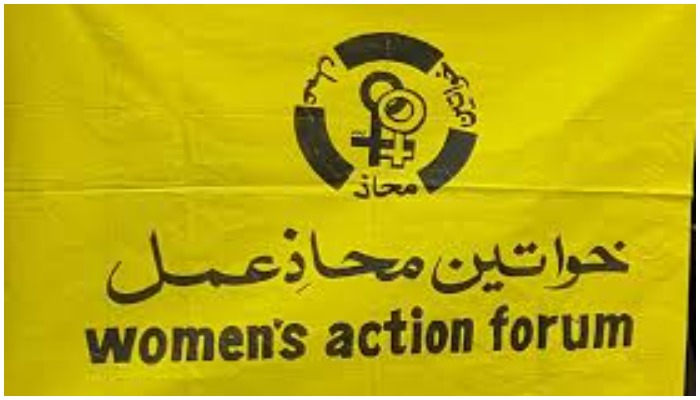Women’s Action Forum says RTI Amendment Bill 2021 will curtail citizens' rights
Amendment bill will exclude Senate, NA, their secretariats, committees & members from “public body” definition
The Women’s Action Forum (WAF) on Sunday condemned Senator Waleed Iqbal and others' action in moving the “Right of Access to Information (Amendment) Act, 2021” before the Senate.
According to a statement issued by the forum, the amendment bill aims to exclude the Senate, the National Assembly, their secretariats, committees and members from the definition of “public body”, contained in Section 2(ix)(c) of the Right of Access to Information Act, 2017.
As per the “Statement of Objects and Reasons”, this amendment bill is premised on an incorrect understanding of the role of Parliament, as a public body, in a democracy, and a deeply flawed understanding of Constitutional provisions, including Article 69 of the Constitution, the statement said.
"In line with other regressive laws, rules and policies that have been recently introduced to curtail the rights to expression and information, this amendment bill similarly attempts to roll back the right to information, protected under Article 19A of the Constitution," it further read.
The right to information, safeguarded in Article 19A of the Constitution, clearly stipulates: “Every citizen shall have the right to have access to information in all matters of public importance subject to regulation and reasonable restrictions imposed by law”.
In the Province of Punjab v. Qaisar Iqbal (PLD 2018 Lahore 198), the importance and scope of Article 19A was clearly set out by the Lahore High Court.
In paragraph 61, the Honourable Lahore High Court observed: “Right to information and access to information in all matters of public importance is indisputably a fundamental right guaranteed under Articles 19 and 19A of the Constitution. The right to information stems from the requirement that members of a democratic society should be sufficiently informed that they may influence intelligently the decision which may affect themselves”.
In suggesting that the Parliament, the Senate, their secretariats, committees and members be excluded from the scope of the 2017 Act, there is a deliberate attempt being made to subvert the Constitutional guarantee contained in Article 19A, the statement read.
In the aforementioned case, the Lahore High Court explicitly stated: “The people of Pakistan have a right to know every public act, everything that is done in a public way, by their public functionaries and chosen representatives”.
If this regressive amendment bill is not defeated, it will deprive citizens of their right to access information.
"We [at the WAF] urge the Senate Standing Committee on Information, before which this bill will be placed on 15 February 2021, to reject this instrument," the statement read.
"The Parliament cannot be excluded from the scope of the 2017 Act as without information from or relating to, the Parliament and Parliamentary debates, procedures and business, the citizens of Pakistan cannot make informed and responsible decisions regarding their collective future."
"In fact, the enactment of this instrument would ensure further deterioration in the quality of political discourse, which would ultimately negatively impact the political participation of citizens in matters of public importance. The devastating impact of this on Pakistan’s already fragile democracy cannot be emphasized enough."
As the key functions of the Parliament include lawmaking, determining the national budget, discussion on issues of public importance and concern, and monitoring and oversight, it is illogical and unconstitutional to exclude it from the scope of the 2017 Act.
It is unfortunate that instead of respecting fundamental rights and abiding by the Constitution, this government chooses to supersede the Parliament by legislating via ordinances.
Its members routinely present bills to further curtail rights guaranteed by the Constitution.
"This amendment bill is yet another attempt to limit transparency and accountability with respect to State action. Parliament is accountable to the citizens of Pakistan. Therefore, we need greater transparency vis-à-vis its workings and decision-making at all levels," the statement further said.
No public representative or a public body should be above scrutiny and accountability. As is apparent from this move and similar attempts prior to it, accountability is something this Government seems to believe others must be subjected to but that its own members can and should be excluded from the same.
The WAF unequivocally condemns such selectivity and authoritarian moves and accordingly demands that this bill be withdrawn immediately, the statement concluded.
-
Security forces gun down 30 terrorists in multiple IBOs in KP: ISPR
-
MQM-P calls for new province in Sindh
-
US report validates Pakistan military edge over India: PM
-
Banned TTP poses serious threat to Pakistan security: UNSC panel
-
CM Afridi clarifies remarks on by-poll after ECP requests army deployment
-
Dubai sees 3.2m Pakistani passengers in 2025 as airport sets new milestone
-
Security forces kill 23 Indian proxy terrorists in KP's Kurram
-
Pakistan to construct island to boost oil exploration: report












